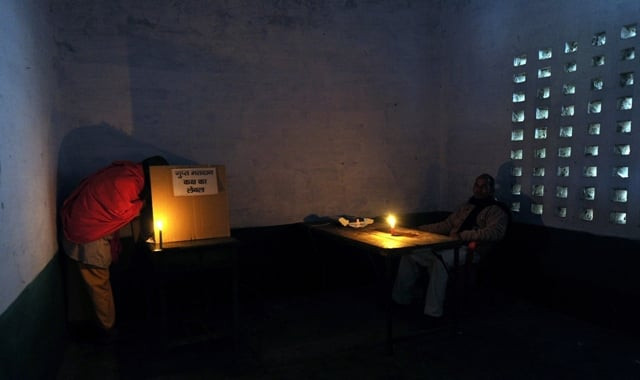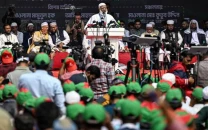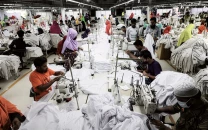India’s most populous UP state goes to polls
State chief electoral officer put turnout in the first six hours at nearly 30%.

Rahul Gandhi, whose family has dominated post-independence Indian politics, has led campaigning for the Congress party in politically vital Uttar Pradesh (UP) in a key test of his ability to become a national leader.
The 41-year-old is widely seen as a prime minister-in-waiting, but he faces a tough task reviving the fortunes of Congress in a state where the party has been out of power for 22 years and was trounced in the last elections in 2007.
Arrayed against him is the formidable and mercurial figure of Chief Minister Mayawati, a low-caste populist who inspires a devoted following from those at the bottom of India’s strict social order.
She trumpets her efforts to fight discrimination and improve the lives of the poor and marginalised, but her administration also stands accused by critics of rampant corruption and wasting public funds on vast urban landscaping projects. She has built statues of low-caste icons – including herself – in huge parks in the state capital, with total expenditure estimated officially at more than a billion dollars.
Uttar Pradesh has a population of about 200 million. If it were a country it would be the world’s fifth-most populous, larger than Brazil, and in places it has poverty as bad as in sub-Saharan Africa.
“I get angry when I see UP lagging behind the rest of the country,” declared Gandhi last week.
Seventeen million people are expected to vote on Wednesday for a new state assembly in the first phase of the local elections that will be held in seven stages until March 3. Results will be announced on March 6.
No accurate polling data exists, but the main contest is between Mayawati’s Bahujan Samaj Party (BSP), another regional caste-based group the Samajwadi Party (SP), Congress and the Hindu nationalist Bharatiya Janata Party.
In Barabanki, about 35 kilometres from the state capital Lucknow, morning rain put off early voters but their numbers had swelled by the afternoon.
State Chief Electoral Officer Umesh Sinha put turnout in the first six hours at nearly 30%.
“We have seen enough of the SP and BSP and it’s time we give a chance to the Congress that has been out of power for a long time,” 65-year-old Mohammed Zahir Akhtar, a retired government employee, told AFP. “Rahul Gandhi shows some promise.”
What happens in caste-riven UP, where politicians have also courted the large Muslim minority community – seen as vital to electoral success – will influence the government at the national level.
The state will send 80 members to the 552-seat parliament in the next national elections due in 2014 and a poor performance by Congress would damage Gandhi, as well as under-fire Prime Minister Manmohan Singh.
Congress is the head of a ruling coalition that has been beset by corruption problems over the last 18 months, including from the bungled sale of telecom licences in 2008 and the scandal-hit 2010 Delhi Commonwealth Games.
More recently, an economic slowdown and government U-turns on key reforms have led to fierce media criticism that paralysis in Singh’s government is hurting the country.
The UP election is the biggest and most important of five state polls being held up to March 3. The others are in the neglected northeastern state of Manipur, the agricultural heartland of Punjab, the holiday state of Goa and the mountainous region of Uttarakhand, where a frustrated resident had tried to attack Gandhi with a shoe.



















COMMENTS
Comments are moderated and generally will be posted if they are on-topic and not abusive.
For more information, please see our Comments FAQ